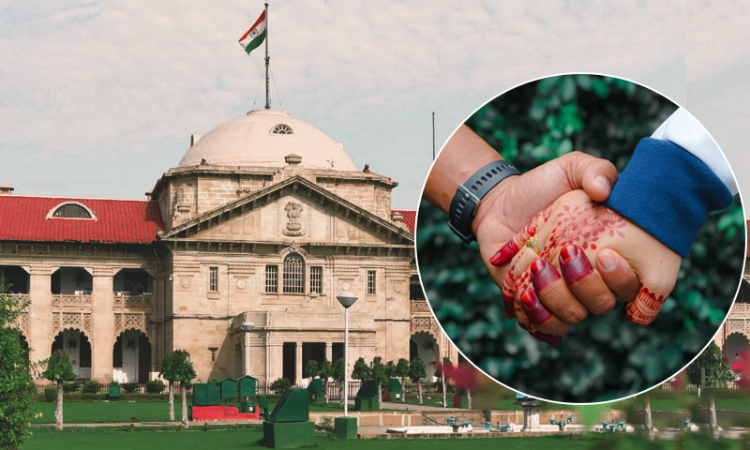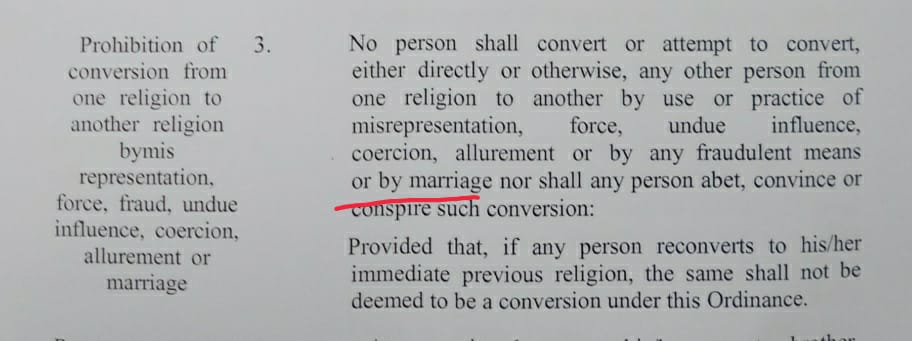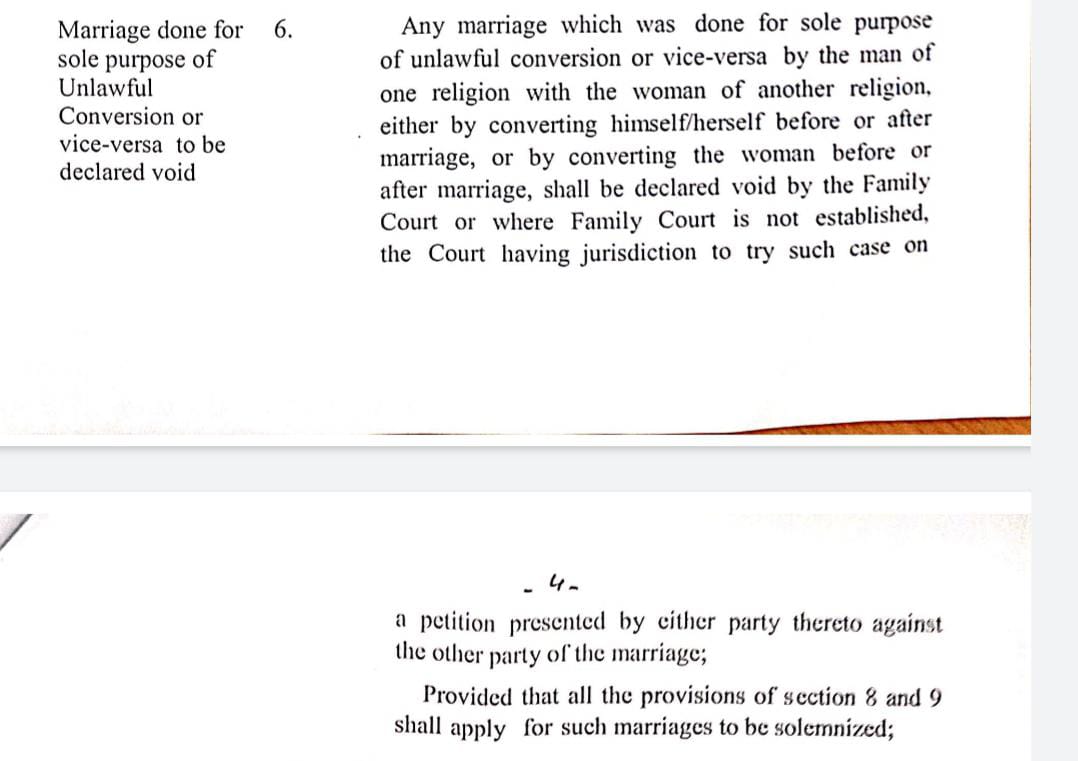Allahabad HC Verdict Comes As Saviour For Inter-Religious Couples Caught Between Special Marriage Act & UP Anti-Conversion Ordinance
Manu Sebastian
14 Jan 2021 10:04 AM IST

The landmark verdict delivered by the Allahabad High Court to remove the mandatory publication of notice under the Special Marriage Act 1954(SMA) makes a mention of the problematic Uttar Pradesh Ordinance which criminalizes religious conversion for marriage.
Coming amid a surcharged atmosphere created by rampant arrests under the Uttar Pradesh Prohibition of Unlawful Conversion of Religion Ordinance, the judgment, which makes it easier for couples to register marriage under the secular law, is highly significant.
There are anecdotes shared in public by many inter-faith couples that they opted the route of marriage under personal law after religious conversion so as to escape the mandatory publication under the Special Marriage Act, which exposes them to harassment and intimidation at the instance of their hostile families(read here, here, here, here and here).
"Couples marrying without the consent of their parents frequently opt for temple-weddings, Arya Samaji weddings, or weddings after conversion to Islam. Although far from ideal, conversion in reality has emerged as the practical way to cohabit as a couple, in a country where neither inter-faith, inter-caste nor living-in couples can earn societal approval", researcher Saumya Saxena wrote in The Wire.
A research article written by Namita Bhandare and Surbhi Karwa in 'Article 14' shared different accounts to show how SMA was energizing vigilante groups and aiding police intervention to kill inter-faith love.
"Reports have shown that the mandatory 30-day notice period to raise objections to a proposed marriage under the Act allows the harassment of the couple by family members or even goons, who are opposed to their marriage. To avoid such harassment, couples may have opted to convert to their partner's religion to get married without the 30-day waiting period. For some individuals, the choice of their partner is much more important his/her religion", legal scholar Anurag Bhaskar wrote.
So, the Special Marriage Act(SMA), a secular law, was acting as a tool for harassment - in an unintended manner - at the hands of vested interests seeking to prevent inter-religious marriages.
High Court took note of ground realities and practical problems
The judgment of the High Court(Safiya Sulthana v State of UP), which came in a habeas corpus petition filed by a couple, makes a note of this unintended consequence of the procedure under the SMA.
The petition sought a writ of habeas corpus against the illegal detention of the wife by her father. The wife, originally a Muslim, had married a Hindu man as per Hindu rituals after converting to Hinduism. Despite such marriage, the wife was kept under confinement by her father. In such circumstances, the couple petitioned the High Court seeking its intervention to allow them to live together as a married couple.
The High Court directed for the presence of the wife and her father. After interactions with the court, the father accepted the right of his daughter to marry a person of her choice.
During the interactions, the couple told the bench that they had thought of registering marriage under the Special Marriage Act but backed off in view of the mandatory requirement of 30 days prior notice. They said that "such notice would be an invasion in their privacy and would have definitely caused unnecessary social pressure/interference in their free choice with regard to their marriage".
They also informed the bench that they opted for religious marriage after conversion as personal law does not impose any such condition of mandatory notice. The court recorded their submission that there are many similarly situated persons like them who face hassles due to the the process under the SMA. The petitioner's counsel also told the court that the situation might become more 'critical' with the notification of the UP Ordinance as the same prohibits conversion of religion by marriage to be unlawful.
The judgment authored by Justice Vivek Chaudhury records their submissions as follows :
"...while interacting with the Court on their personal appearance, the young couple expressed that they could have solemnized their marriage under the Special Marriage Act, 1954 but the said Act requires a 30 days notice to be published and objections to be invited from the public at large. They expressed that any such notice would be an invasion in their privacy and would have definitely caused unnecessary social pressure/interference in their free choice with regard to their marriage.
The personal laws do not impose any such condition of publication of notice, inviting and deciding objections before solemnizing any marriage. They further state that such a challenge is being faced by a large number of similarly situated persons who desire to build a life with a partner of their own choice. Learned counsel for petitioners also stated that the situation may become more critical with notification of Uttar Pradesh Prohibition of Unlawful Conversion of Religion Ordinance, 2020, as the same prohibits conversion of religion by marriage to be unlawful".
It was in this backdrop that the High Court decided to revisit the provisions of the Act. Since the issues raised by the petitioners involve right of life and liberty of a large number of persons, the court said it is "duty bound to consider their submissions".
The UP Ordinance has troublesome provisions to criminalize conversion by marriage and to invalidate conversion for marriage and marriage for conversion.


So, the effect of the Ordinance is to shut the door of personal law marriage for couples who feel terrorized by the hostile procedure under the Special Marriage Act. Mixed couples are now caught between the devil and the sea : if they convert, they will invite police arrest under the UP Ordinance; opting for special marriage will invite external interference.
'Cruel and unethical to force present generation to follow 150 year old process'
The Court said that there was "no apparent reasonable purpose achieved" by notice process under the Special Marriage Act when there is no such process in personal law, under which majority of the marriages take place. This amounts to discrimination violating the fundamental rights of the class of people who opt to get married under the SMA.
The Court said that the provisions of the SMA needs to be read down in the light of the new developments in the constitutional law such as the declaration of right to privacy as a fundamental right under Article 21 as per the Puttaswamy judgment. It said that the provisions need to be given an interpretation "that would uphold the fundamental rights and not violate the same". Even if marriage is registered on false representations or suppression of material facts, there are options under law to take action, the court noted.
Justice Vivek Chaudhary's judgment emphasized on the right to freedom of marriage "without interference from both state and non-state actors" while ruling against mandatory publication of notice.
Also, after tracing the history of the Special Marriage Act 1954, the court noted that the process is more or less the continuation of the British law, the Special Marriage Act 1872.
"The procedure of publishing a notice and inviting objections from public at large, as was provided under Act of 1872 was, thus, also adopted by the Act of 1954 with minor variations", the Court noted.
Taking note of this aspect, the Court made a striking observation :
"In view of the changed social circumstances and progress in laws noted and proposed by the Law Commission as well as law declared by the judgments of the Supreme Court, it would be cruel and unethical to force the present generation living with its current needs and expectations to follow the customs and traditions adopted by a generation living nearly 150 years back for its social needs and circumstance"
The effect of the judgment on the UP Ordinance
The paradox of personal law acting as a refuge for inter-faith couples and the secular law turning out to be a source of harassment for them is reflected in the judgment.
In this context, it is pertinent to refer to a curious argument made by the the UP Government, in its affidavit filed in response to cases challenging the 2020 Ordinance on conversions. It has argued that conversion for marriages are done due to compulsions of personal law and therefore such conversions cannot be termed as an exercise of free choice. The Ordinance was meant to protect such individuals who forsake their faith under pressure from personal law, claimed the affidavit of the UP government.
The affidavit stated :
"...wherever the personal law comes into play and the individual exercises the right of personal liberty but the personal law of the community to which the individual wants to enter upon by changing his (gender neutral) religion or religious practice causes issue of complexities as the dignity of the individual, gets compromised and the individual is not assured the equality of status. Thus what happens is that the individual while exercising the right of personal liberty loses his dignity and equality of status to the religion which he does not adopt but is trying to take benefit of some-sort by being in the society of the member of the other religion. In such situation the individual even though has not changed his religion but has only exercised the right of liberty/choice to be in association with member of other religion but is deprived of the benefits as the benefit of the new religion will not be available unless and until a conversion takes place This conversion will be against the choice of the individual who wants to remain in the society with the member of other religion but does not want to leave his faith. Thus there is a conflict of interest which is an issue addressed by means of the instant legislation wherein the inter fundamental right of the individual are safeguarded".
However, the ground realities are different, as shown by the judgment. Inter-religious couples consider religious marriages a safer option due to the hassles under the Special Marriage Act. The effect of the UP Ordinance was to make that option also unsafe by criminalizing conversion for marriage.
Now that the High Court has ironed out the creases under the Special Marriage Act, inter-faith couples can hope to have a safe and smooth marriage registration process, without risking the wrath of the UP Ordinance.


